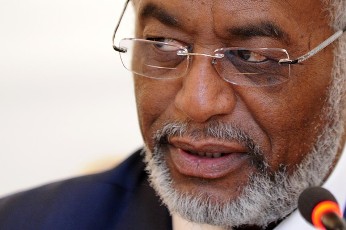Sudan FM weighs in on closure of Saudi airspace to Bashir’s aircraft
August 9, 2013 (KHARTOUM) – The Sudanese foreign minister Ali Karti has criticized Saudi Arabia’s General Authority of Civil Aviation (GACA) over its explanation of why it denied permission to a plane carrying president Omer Hassan al-Bashir on his way to Iran last Sunday.

Karti said that the air traffic controllers then asked the pilot to wait, but 15 minutes later he renewed contact with the control tower only to be told that he should turn around and head back to Khartoum.
Jeddah airport then “immediately” disconnected channel of communication without inquiring about whether there is some sort of emergency on the flight, he added.
“The pilot wrote an account of what happened and I was witness to it,” the Sudanese top diplomat said.
Saudi aviation authorities emphasized in two statements they released this week that Sudan did not seek pre-approval for the flight adding that it should be obtained 48 hours in advance in coordination with governments in both countries.
But Sudan’s Civil Aviation Authority (SCAA) said that the chartered flight flown by a foreign crew is registered in Jeddah and as such has automatic clearance to fly through Saudi Arabia. They also said that details of the flight were communicated to Jeddah airport few hours prior to departure.
GACA responded by saying that the plane is registered outside Saudi Arabia and that only the owner can claim the blanket clearance when on board and stressed that he cannot lease it or use for commercial purposes.
They further noted that simply relaying information about the flight does not constitute approval and criticized the SCAA for not following the rules and protocols saying it “should have known better”.
Karti is the most senior official to directly address this incident and his remarks signal a feeling that Riyadh prevented Bashir’s flight on purpose. The minister however said that the matter is now reviewed on the technical level and that they want the record cleared for that aspect.
He further disclosed that they have not reached out to Riyadh directly about what happened adding that there is no tension or misunderstanding between the two countries.
Yesterday Saudi Arabia’s Charge d’affaires in Khartoum Saeed al-Ghamdi told the pro-government Ashorooq TV that he was summoned by the Arab Bureau at the Sudanese foreign ministry to receive a formal query from the government on the incident.
He downplayed the significance of what happened calling it “simple” that would not impact bilateral relations and reiterated that a permit was required to clear the flight.
On Sunday, Iran’s ISNA news agency quoted Iranian Foreign Ministry spokesman Abbas Araqchi as saying that flight permissions for Bashir’s plane had been obtained in advance but offered no details.
A similar situation occurred in June 2011 when Turkmenistan and Tajikistan refused to grant permission to Bashir’s plane in order to reach China where he was to start a state visit. As a result he was forced to return to Tehran where he was attending a summit there and decide on a new route to reach Beijing.
Observers speculated that Sudan’s growing ties with Iran could have irked the Saudis prompting them to block Bashir’s flight.
Sudan twice allowed Iranian warships to dock in Port Sudan last year, drawing concern by the United States and its allies in the Gulf.
In an editorial last November titled “The fall of masks between Iran and Sudan”, the Saudi pro-government Al-Riyadh newspaper blasted Khartoum over allowing entry to the Iranian warships, saying there is no “logical justification” for a relationship between the two countries.
Bashir has generally seen his travel difficulties mount in the wake of the two warrants issued by the Hague-based International Criminal Court in 2009 and 2010 for war crimes, crimes against humanity and genocide over the conflict in Sudan’s Darfur region.
He was forced to cancel many appearances since then for fear of arrest.
Saudi Arabia, however, was one country Bashir frequently visited after his indictment as Riyadh is not party to the ICC statute.
(ST)
